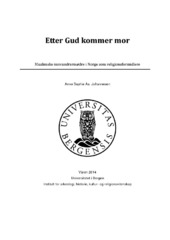| dc.contributor.author | Johannesen, Anne Sophie Aarestrup | eng |
| dc.date.accessioned | 2014-08-11T08:54:09Z | |
| dc.date.available | 2014-08-11T08:54:09Z | |
| dc.date.issued | 2014-05-14 | eng |
| dc.date.submitted | 2014-05-14 | eng |
| dc.identifier.uri | https://hdl.handle.net/1956/8249 | |
| dc.description.abstract | Denne masteroppgaven tar for seg hvordan muslimske innvandrermødre videreformidler islam til barna i Norge. Masteroppgaven bygger på funn fra fem kvalitative intervjuer av muslimske innvandrermødre som ble gjennomført i en by på Vestlandet. Temaene som blir behandlet i oppgaven er: hva mødrene anser sin religionsformidlerrolle for å innebære, hvorvidt deres religionsformidlerrolle har endret seg etter at de kom til Norge, om de anser barna for å være godt nok rustet til å holde fast på islam etter en oppvekst i Norge, og om den norske påvirkningen på barna har hatt innvirkning på kvinnenes religionsformidlerrolle. Først blir metoden og teoriene som blir benyttet i oppgaven presentert, fulgt av en kort presentasjon av respondentene. Deretter blir funnene fra intervjuene diskutert og analysert, etterfulgt av konklusjon, refleksjon og presentasjon av oppgavens faglige og samfunnsmessige nytteverdi. Generelt anså kvinnene sin religionsformidlerrolle som veldig viktig. De anså barna for å være godt nok rustet til å forbli muslimer, men for å forsikre seg valgte de å opprettholde en viss avstand til det norske samfunnet. I funnene var det likevel en del eksempler som tyder på påvirkning fra det norske samfunnet, for eksempel ved at de la mer vekt på tro enn praksis. | en_US |
| dc.description.abstract | This master's thesis explores how Muslim immigrant mothers in Norway transmit Islam to their children. The thesis is based on qualitative interviews with five Muslim immigrant mothers in a town in Western Norway. The themes which are treated in the thesis are: what the mothers regard their responsibilities as religious transmitters to entail, whether their role as religious transmitters has changed upon arrival in Norway, if they believe their children are equipped to stay Muslim after having grown up in Norway, and whether the Norwegian influence on their children has altered their role as religious transmitters. Firstly, the methodology and theories, which are applied in the thesis, are presented, as well as a short presentation of the interviewees. Then the findings from the interviews are discussed and analysed, followed by a conclusion, reflections and a discussion of possible further use of the findings in the thesis. In general the mothers regard their responsibilities as religious transmitters as very important. They believe their children are equipped to keep their Muslim faith, but to ensure this they uphold a distance between themselves and the Norwegian society to a certain extent. Still, there are findings that suggest that they have been affected by the Norwegian society, for instance by focusing to a larger degree on faith rather than ritual. | en_US |
| dc.format.extent | 1299458 bytes | eng |
| dc.format.mimetype | application/pdf | eng |
| dc.language.iso | nob | eng |
| dc.publisher | The University of Bergen | eng |
| dc.subject | Muslimer | |
| dc.subject | Innvandrere | |
| dc.subject | Innvandrerkvinner | |
| dc.subject | Religionsopplæring | |
| dc.subject | Islam | |
| dc.title | Etter Gud kommer mor. Muslimske innvandrermødre i Norge som religionsformidlere | eng |
| dc.type | Master thesis | |
| dc.rights.holder | Copyright the author. All rights reserved | |
| dc.description.degree | Master i Religionsvitenskap | |
| dc.description.localcode | MAHF-RELV | |
| dc.description.localcode | RELV350 | |
| dc.subject.nus | 714999 | eng |
| fs.subjectcode | RELV350 | |
